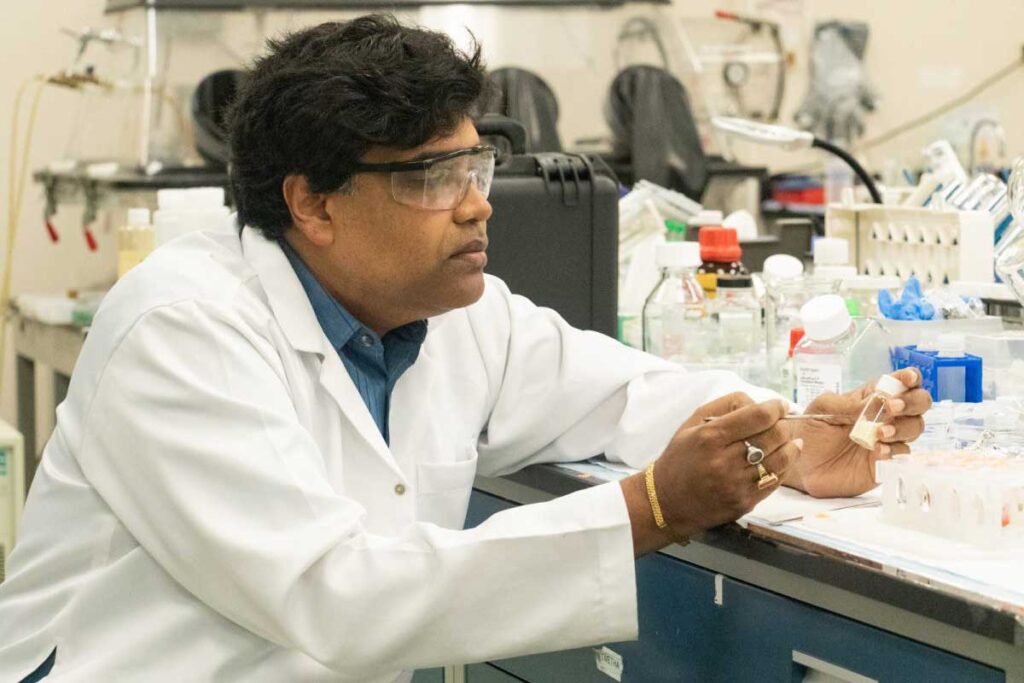The University of Central Florida has moved into the ranks of the top 25 public universities in the nation for patents granted, according to the latest report from the National Academy of Inventors (NAI).
UCF secured 63 patents in 2022, ranking it No. 52 in the world and No. 23 among public universities in the nation, as shown in the annual Top 100 Worldwide Universities Granted U.S. Utility Patent rankings report released this week.
This places the university ahead of leading public and private institutions such as Yale University (61 patents), Carnegie Mellon University (59 patents), the University of North Carolina at Chapel Hill (49 patents) and Florida State University (33 patents).
This is the 10th year that UCF has ranked in the top 100 universities in the world for patents, and the new ranking represents an eight-spot jump from last year’s worldwide ranking.
“I continue to be impressed by the sustained technology development of our UCF researchers — placing UCF among the top 25 public universities in the U.S. for patents granted and surpassing many other prestigious institutions,” says Winston Schoenfeld, UCF’s interim vice president for research and innovation. “UCF’s consistent top rankings over the last decade demonstrate our strong dedication as a research institution to innovation and translation for societal benefit.”
Svetlana Shtrom, director of UCF’s Office of Technology Transfer, says UCF is very strategic in selecting inventions for patent protection to ensure fiscal responsibility and to maximize the potential of receiving impactful patents.
“Not every invention results in a patent,” Shtrom says. “For an invention to be patentable, it must be deemed by the United States Patent and Trademark Office to be novel, nonobvious and useful. UCF’s success in receiving patents reflects the depth of the university’s research and the commitment of its researchers to seek solutions to pressing problems, identify the most efficient and effective methods, and reach beyond the well-established standards to create impactful innovations.”
Here are a few of the UCF inventions that led to patents in 2022:
Interdigitated Electrodes For In vitro Analysis of Cells
Lead researcher: Swaminathan Rajaraman, associate professor, NanoScience Technology Center
This invention is a new tool that enables electrical and optical analysis of single cells and cell networks. It combines the simplicity of an interdigitated electrode (IDE) with the sophistication of plasmonics for in vitro biosensing applications. The invention may be used in applications such as in vitro drug development, single-cell analysis, toxicity testing and organ-on-a-chip models.
UCF is actively seeking licensing partners for this technology.

Cerium Oxide Nanoparticle Compositions and Methods
Lead researcher: Sudipta Seal, Pegasus Professor and chair of the Department of Materials Science and Engineering
This invention is a wet chemical synthesis process for fabricating cerium nanoparticles (CNPs) used in biomedical applications. With the UCF technology, companies can create CNPs that have the same material but comprise different properties. In one example application, the CNPs can be used to develop therapeutics to treat radiation exposure.
UCF is actively seeking licensing partners for this technology.
About the Rankings
The NAI has released the rankings based on calendar year data provided by the United States Patent and Trademark Office (USPTO) since 2013.
The NAI is a member organization comprising U.S. and international universities, and governmental and nonprofit research institutes, with more than 4,000 individual inventor members and fellows spanning over 250 institutions worldwide. It was founded in 2010 to recognize and encourage inventors with patents issued from the USPTO, enhance the visibility of academic technology and innovation, encourage the disclosure of intellectual property, educate, and mentor innovative students, and translate the inventions of its members to benefit society.
